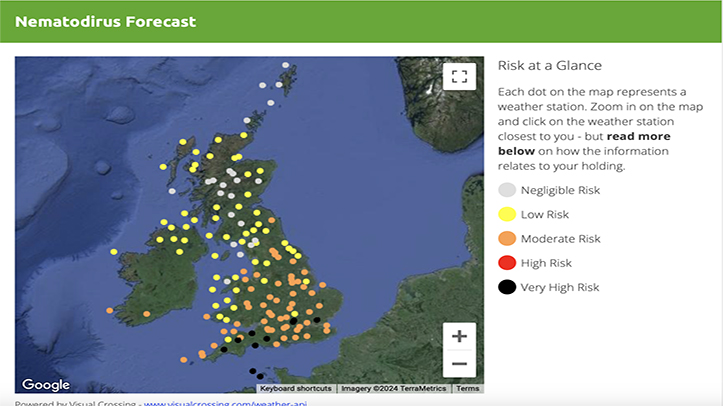Following a very wet winter and one of the warmest Februarys on record, experts in the Sustainable Control of Parasites in Sheep (SCOPS) group are predicting the threat to lambs from nematodirus will be extremely variable across the UK in 2024.
Using the SCOPS Nematodirus Forecast at www.scops.org.uk/nematodirus will be really important to help prevent individual flocks being caught out, as well as checking the pattern of temperatures in recent weeks to decide if lambs are at risk.
Lesley Stubbings, independent sheep consultant and SCOPS spokesperson, said: “A sudden increase in temperature after a period of cold weather can trigger a mass hatch of Nematodirus battus worms, from eggs that have laid dormant since the previous season.
“If this coincides with the time when lambs are starting to take in significant amount of grass the result can be devastating. It can happen very quickly, so producers cannot afford to have a ‘wait and see’ policy, nor one that simply assumes the danger period will be the same every year.
“Nematodirosis is caused by large numbers of immature larvae that lambs take in off pasture. These immature larvae are not producing eggs, so this is the one time of year when faecal egg counts (FECs) aren’t as useful. Instead, producers need to keep an eye on the forecast – which is a free, online resource – and consider their individual risk factors.”
Nematodirus risk factors
- Lambs are grazing pasture that carried lambs last spring;
- Lambs are old enough to be eating significant amounts of grass;
- Lambs are in groups where there is also likely to be a challenge from coccidiosis (e.g. mixed aged lambs);
- Lambs are under stress (e.g. triplets, fostered, on a young or older ewes); and
- A sudden, cold snap followed by a period of warm weather.
The SCOPS Nematodirus Forecast is updated daily using data from 140 weather stations around the UK.
Mrs Stubbings explained: “The colour-coded dots on the forecast provide a guide to the risk level in your area. Find the dot that is nearest to you or most representative of your farm. The height above sea level of each weather station is provided, as every 100m increase in altitude delays hatching by about seven days.
“So, if your nearest station is at 200m above sea level but your farm is at 100m, for example, hatching could be around seven days earlier than the forecast. South-facing fields also tend to have an earlier hatch.”
Although FECs are not useful for monitoring the nematodirus risk level, SCOPS does still recommend using FECs. They will help monitor other roundworm species and, if they identify nematodirus eggs, this can indicate what the level of contamination (numbers of nematodirus eggs) is going onto a pasture and, therefore, how risky they will be next spring and which areas to try to avoid if possible.


